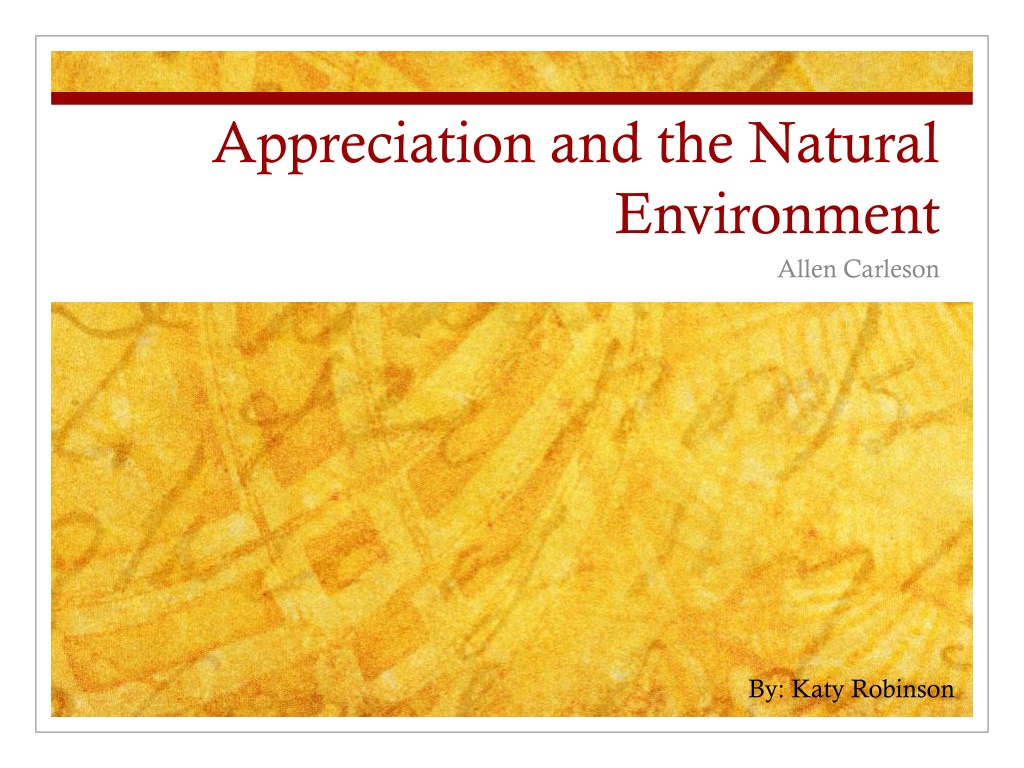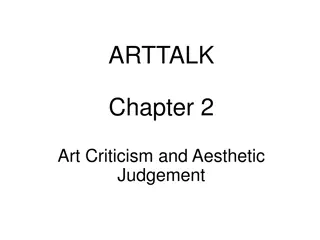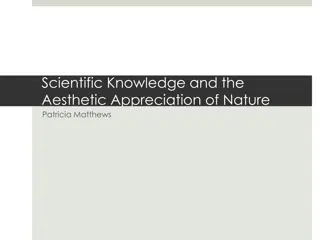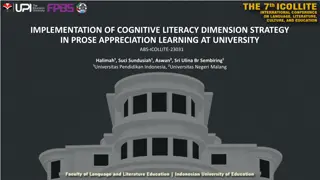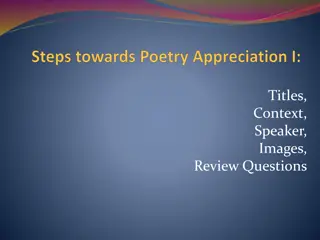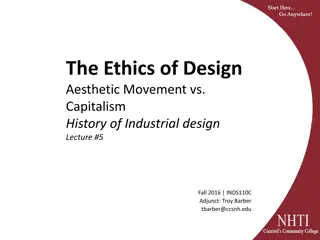Exploring Aesthetic Appreciation of the Natural Environment
Exploring the nuances of appreciating the natural environment through different artistic models such as the Object Model and Landscape Model. Dive into the challenges and unique qualities of observing nature aesthetically, and the interplay between human perspective and the environment's inherent beauty.
Download Presentation

Please find below an Image/Link to download the presentation.
The content on the website is provided AS IS for your information and personal use only. It may not be sold, licensed, or shared on other websites without obtaining consent from the author. Download presentation by click this link. If you encounter any issues during the download, it is possible that the publisher has removed the file from their server.
E N D
Presentation Transcript
Appreciation and the Natural Environment Allen Carleson By: Katy Robinson
Appreciation of Art We have a sense of what and how to appreciate art objects aesthetically What: we distinguish a work and its parts, as well as relevance How:we know what acts of aspection to perform while Different pieces have different boundaries, and by knowing a type, we know what and how to appreciate it We must know the background (ex: an art historian is better equipped for appreciation)
The BIG question What and how do we aesthetically appreciate the natural environment? Two artistic models for the appreciation of nature: Object Model Landscape Model Environmental model for the appreciation of nature
Object Model We actively and contemplatively remove an object from its surroundings and dwell on its sensuous qualities 1. Natural objects are often appreciated in this way 2. It fits with one feature 3. Traditional aesthetic approach
Object Model Problem: Landscape has indeterminate form Limitations: Appreciating nature vs. objects of nature Required removal from surroundings before we know what and how to appreciate Unlike art, natural objects have an organic unity with the environment, which has aesthetic relevance to the object. Its expressive of particular forces shaping it. If we remove the object, we lost this, and if not, the model does not apply.
Landscape Model Comparative in the art world to a landscape painting There s a representation of the object and its represented features Essential qualities: visual coloration and overall design We must view from a specific standpoint and distance Embodied in the scenery cult. Main concept is the picturesque meaning picture like nature- dividing it into scenes
Landscape Model Tourist prefer these scenic viewpoints Regularity of perspective is enhanced by the viewpoint Rees opinion: this confirms our anthropocentrism, suggesting nature is there to please us This becomes an ethical and aesthetic issue Problem: the environment is not a scene Not a representation Not static Not two dimensional
Environmental Model Landscape and Object models inadequate To consider environmentally we must consider self to setting not subject to object or traveler to scene What do we appreciate? Everything How do we appreciate? In which we are normally aware and experience our surroundings
Environmental Model How: we must experience a background with sight, smell, touch etc. and we must experience this not only as an unobtrusive background, but as an obtrusive foreground We must learn to be yielding and careless like a child to enjoy nature polymorphously- bathing in a meld of physical sensations Ex: smell of the hay, warmth of the ground, warmth of the sun, the tickling of an ant, the playing of the shadows, sound of water,
Environmental Model What? Everything We can t appreciate everything- there must be limits and emphasis on things in nature just as there are with art. There s too much- booming, buzzing confusion wouldn t be wholly satisfying. The environment is natural, it is not a work of art. It has no boundaries or foci of aesthetic significance that are given as a result of our creation nor of which we have knowledge because of our involvement in such creation.
The Main Point We have not created nature, though we know a great deal about it. This scientific/common sense seems to be the only viable candidate for playing the role concerning the appreciation of nature (ex: as an art historian is better off for appreciation of art) Must be a consummatory experience, where knowledge transforms raw experience by making it determinate, harmonious and meaningful This helps us understand what acts of aspection to be using Not only important for aesthetic but moral and ecological reasons as well
